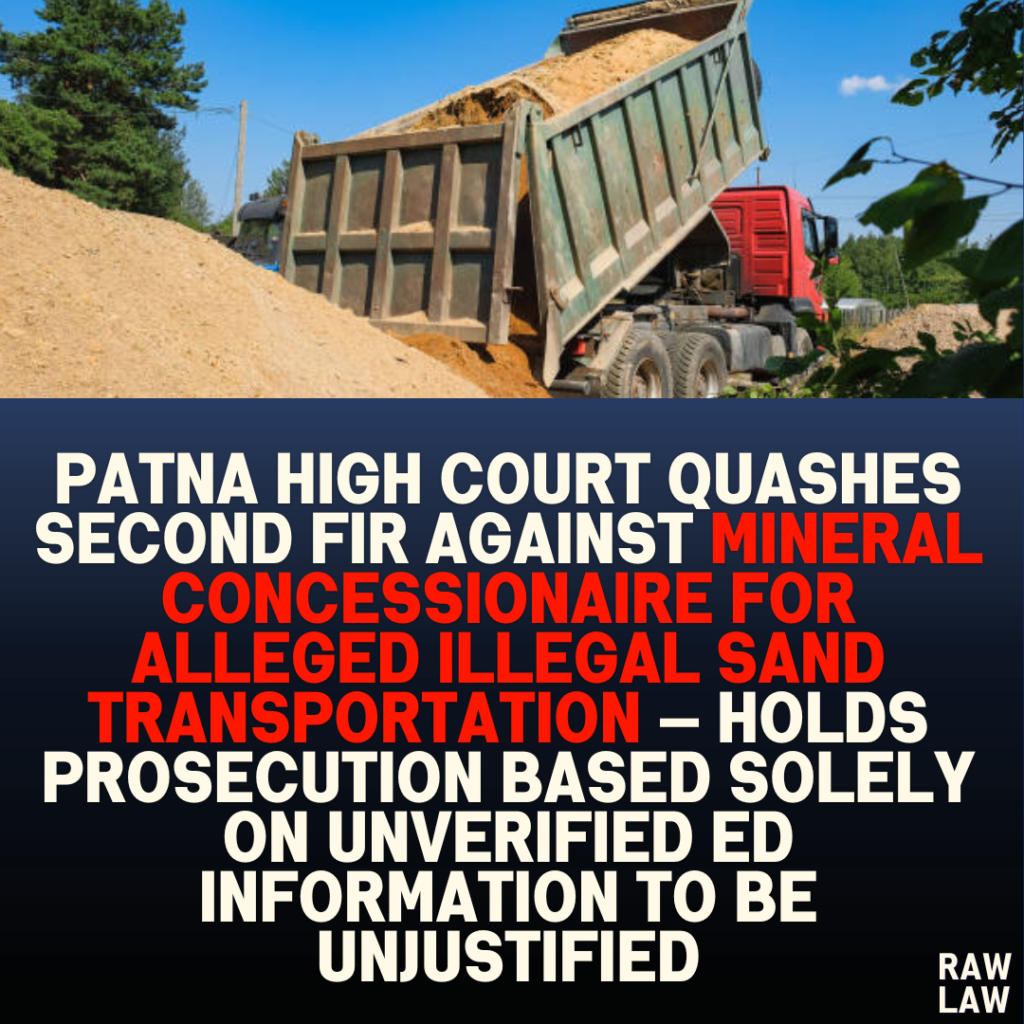Court’s Decision:
The Patna High Court quashed the second FIR lodged against a mineral concessionaire under Sections 379 and 420 of the IPC and Rule 56 of the Bihar Minerals Rules, 2019, stating that the FIR was based solely on unverified information provided by the Enforcement Directorate (ED) and lacked independent verification by the Mining Department. The Court found the registration of multiple FIRs on the same set of facts to be impermissible and an abuse of the process of law.
Facts:
- The petitioner, a mineral concessionaire, was previously granted a license to excavate and sell sand in the districts of Aurangabad and Rohtas until September 30, 2021.
- After surrendering its settlement in April 2021, the petitioner sought verification of its sand stock and permission to sell the same, which was denied.
- Subsequently, FIRs were lodged against the petitioner by the Mining Department, alleging illegal transportation and sale of sand worth ₹38,71,46,070/- from April 2020 to August 2020 without generating e-transit challans, causing a revenue loss to the state.
- The FIRs were based on information provided by the ED, which was derived from Income Tax Department records related to another entity.
- The petitioner argued that the information used was unverified and based on loose sheets, which lack evidentiary value, and contested the registration of two separate FIRs on identical grounds.
Issues:
- Whether the registration of a second FIR based on the same facts as the first FIR is maintainable.
- Whether the FIRs were validly lodged under Rule 56 of the Bihar Minerals Rules, 2019, considering the alleged offences occurred before the rule’s amendment.
- Whether the unverified information provided by the ED could form the basis of a criminal prosecution.
Petitioner’s Arguments:
- Validity of the Second FIR: The petitioner argued that the second FIR, Dehri Town PS Case No. 115 of 2024, was not maintainable since it was based on the same set of facts and information as the earlier Daudnagar PS Case No. 047 of 2024.
- Unverified ED Information: The petitioner contended that the FIRs were lodged on the basis of unverified information gathered from loose sheets, which lack evidentiary value, and that there was no independent verification by the Mining Department.
- Non-Cognizable Offence: The petitioner argued that prior to the amendment in Rule 56, the alleged act of transporting sand without a challan was punishable only under Rule 39(3), which is not a cognizable offence and thus does not warrant criminal prosecution.
- Requirement of Collector’s Sanction: The petitioner submitted that as a mineral concessionaire, the competent authority to sanction any prosecution was the District Collector, which had not been obtained.
Respondent’s Arguments:
- The respondent (Mining Department) argued that the FIRs were maintainable as all the alleged offences under the IPC and the Bihar Minerals Rules were prima facie made out against the petitioner.
- It was submitted that the documents relied upon by the petitioner were not part of the charge sheet and, therefore, could not be considered by the Writ Court.
- However, the respondent admitted that the second FIR was registered on the same set of facts as the first FIR.
Analysis of the Law:
- The Court analyzed the provisions of Rule 39 and Rule 56 of the Bihar Minerals Rules, 2019, and observed that the amendments made in 2021 were not applicable to offences committed prior to the amendment.
- Rule 39(3) did not make the alleged offence of transportation without a challan cognizable, thus negating the registration of an FIR on that basis.
- The Court relied on the Supreme Court’s precedent in Bhajan Lal’s case, which permits quashing of FIRs that are manifestly frivolous or based on unverified and unreliable information.
Precedent Analysis:
- The Court referred to the decision in State of Haryana vs. Bhajan Lal, which established categories where quashing of FIRs is justified, including when the FIR is lodged with mala fide intentions or lacks any legal basis.
- In T.T. Antony vs. State of Kerala, the Court held that multiple FIRs on the same set of facts are impermissible.
Court’s Reasoning:
The Court found that:
- Both FIRs were lodged on the basis of the same unverified information provided by the ED, without any independent verification by the Mining Department.
- The second FIR was verbatim to the first and registered on identical facts, making it impermissible.
- The prosecution was initiated without the requisite sanction from the Collector, which is mandatory for prosecuting a valid settlee under the Bihar Minerals Rules, 2019.
- Rule 56, as amended, could not be applied retrospectively, and the alleged act could only be prosecuted under the pre-amended Rule 39(3), which is a non-cognizable offence.
Conclusion:
The Court held that the registration of the second FIR was impermissible and quashed both the FIRs — Dehri Town PS Case No. 115 of 2024 and Daudnagar PS Case No. 047 of 2024. The Court observed that the continued criminal proceedings against the petitioner, based on unverified information and without independent assessment, would be an abuse of the legal process.
Implications:
This decision underscores the requirement for independent verification of information provided by external agencies before initiating criminal prosecution. It also reinforces that multiple FIRs on the same set of facts are impermissible and that amendments to rules cannot be applied retrospectively to prosecute alleged offences that occurred before the amendment.



